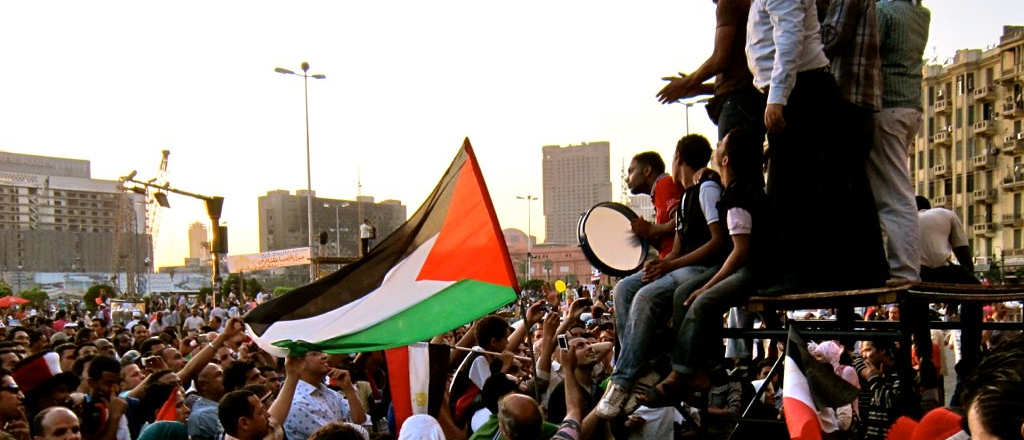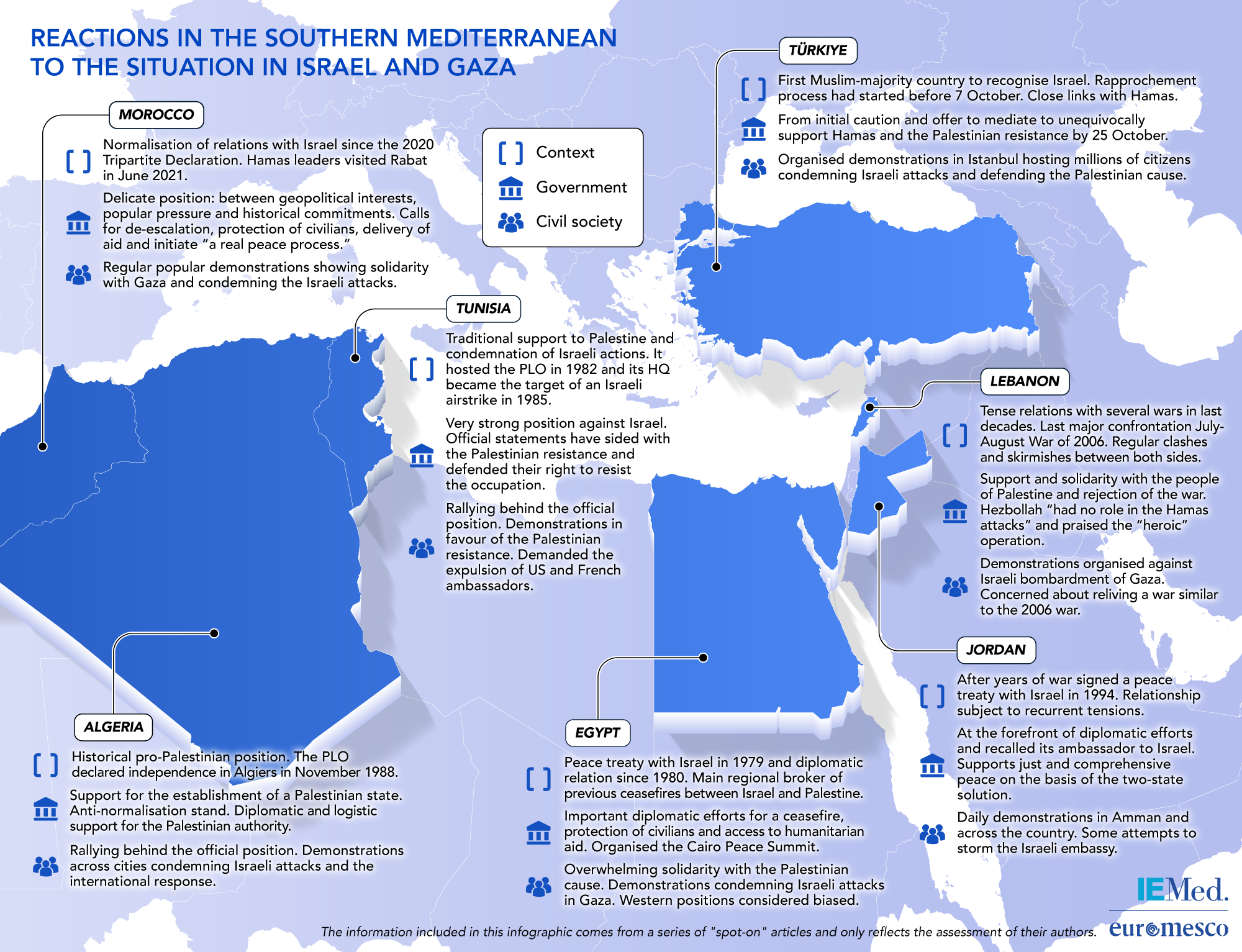
Abstract
Egypt warned about the unprecedented security threat caused by the expansion of hostilities between Israel and the Palestinians. Cairo dealt with the crisis from a comprehensive perspective by stressing the need to protect civilians, assure safe and unhindered access to humanitarian assistance in Gaza and by calling for an immediate ceasefire that would eventually lead to resuming the peace process on the basis of the two-state solution. Firm rejection was also expressed by President Al-Sisi to all sorts of forced displacement of Palestinians, especially to Sinai, fearing that it would endanger Egyptian sovereignty, cause violence spillover, and put the peace between Egypt and Israel at risk. Meanwhile, overwhelming solidarity campaigns are widely spread among the population engaging both politicised and non-politicised actors and confirming the right of Palestinians to resist Israeli occupation.
In a statement by the Egyptian Ministry of Foreign Affairs on the morning of 7 October, Cairo warned about the devastating effects of the escalation between Israel and the Palestinians. Considering these developments as a reaction to a series of provocative measures carried out by Israel in Palestinian cities, Cairo has called upon all parties to halt further escalations and to avoid putting more civilian lives at risk. And as the main regional broker of previous ceasefires between the two conflicting parties, Egypt called on all international powers supporting the peace process to intervene and restrain Israel from more escalations and to abide by the International Humanitarian law standards when it comes to the responsibilities of the occupying power. Given the gravity of the situation and the unprecedented level of confrontations, a wider leverage from international powers is needed in order to halt hostilities and to bring the two parties back to the peace process. Subsequently, Cairo was heavily involved in bilateral consultations with influential international powers with the aim of containing the hostilities, preventing their expansions to the West Bank or to neighbouring countries and providing safe and unhindered access of humanitarian assistance in Gaza.

Official Position: Diplomatic Efforts for Ceasefire and Humanitarian Aid
In his meeting with Antony Blinken on October 15th, President Al-Sisi said that the Israeli response went beyond the right of self-defence and was a collective punishment of the people of Gaza. In reaction to that, the Egyptian authorities have encouraged all charitable and relief organisations to start fundraising to supply humanitarian aid to the Palestinians, and in few days, hundreds of supply trucks were parked near the Rafah crossing waiting for the green light to enter Gaza. Additionally, all North Sinai hospitals and medical teams were put on alert expecting a flow of injured Palestinians coming into Egypt to seek medical care. Israeli bombs reached the adjacent region of the crossing several times leading to its partial destruction from the Palestinian side. Therefore, Egypt refused to allow US and Western passports holders to leave Gaza through the Rafah crossing until suitable aid assistance is allowed in the besieged strip.
The civilian toll in Gaza has deeply marked the Egyptian position; the Israeli bombing of Al-Ahli Baptist Hospital in Gaza killing almost five hundreds civilians prompted leaders of Egypt, Jordan and Palestinian authorities to cancel the Amman summit, scheduled the following day with President Biden who was also visiting Israel to show his solidarity. Instead, and in a joint press conference with the German chancellor Scholz on 18 October, President Al-Sisi was quit firm in framing the root causes of the recent escalation, namely, the need to address the Palestinian cause from a comprehensive approach that allows Palestinians to establish their independent state along the June 1967 borders with Eastern Jerusalem as its capital. He strongly rejected the Israeli call to displace Gazans to the south towards the Rafah crossing with Egypt. In clearer words, President Al-Sisi refused the human transfer of the People of Gaza into Sinai, stating that the Palestinians should never be forcibly displaced outside their land, and they would certainly never be transferred at the expense of the Egyptian sovereignty. He also highlighted that a forced displacement of the Palestinians would end the process of a two-state solution; if the plan was to force Palestinians in Gaza to Egypt and Palestinians in the West Bank to Jordan, then nothing of the Palestinian State would remain.
And to highlight the Israeli responsibility as an occupying state, Al-Sisi suggested the Naqab desert as a temporary place to host civilians from Gaza until the war is over.
A few days later, Cairo hosted a peace summit that brought together Arab, African and international leaders and foreign ministers with the aim of launching a global call for an immediate ceasefire and peace process resumption. However, the divergent positions of the Arab and international leaders failed to reach a unified final declaration for peace. While the Arab leaders emphasised the need for a ceasefire, protection of civilians and respect of the international law, international representatives underlined Israel’s right to defend itself and the condemnation of Hamas. In the following days, Egypt brokered a human release of two of the American female hostages captured by Hamas as well as two other Israeli elderly female hostages that were returned to Israel through the International Red Cross.
Overwhelming Popular Solidarity with the Palestinian Cause
Egypt was still celebrating the fiftieth anniversary of the 6 October victory, when the news about the attack launched by Hamas was disseminated. The main headlines in the Egyptian newspapers highlighted the change in the conflict’s rules, the unprecedented level of the attacks in the history of Israel and the extreme failure of its security and intelligence system. However, fewer voices were warning about the Israeli revenge and the expected escalations threatening thousands of civilian lives in Gaza. While popular reactions on the new media were more outspoken, comparing these attacks to the glorious victory of Egypt which took place fifty years ago when the Israeli army failed to keep its image as invincible. The Iron dome that failed to intercept Hamas’ missiles was compared to the Bar Lev Line that was overrun in a few hours back in 1973. The Hamas military operation infiltrating Israel was regarded as a justified act of resistance against the occupation after a series of systematic attacks by the Israeli forces against Palestinians in the West Bank and East Jerusalem.
The Arab media focused only on the military targets that Hamas managed to take down, fewer voices disagreed with targeting civilians, while others considered Israeli armed settlers living in the immediate vicinity of Gaza legitimate military targets. However, the murder of two Israeli tourists along with their Egyptian tour guide in Alexandria was widely condemned since it was damaging to Egypt’s image as a safe tourist destination and targeted innocent people who had nothing to do with the hostilities going on in Gaza. Nevertheless, all controversies regarding the Hamas operations were downplayed when the civilian toll in Gaza was extensively increasing. The social and independent media played a key role in giving voices to the Gazans on Egyptian platforms; ordinary people from Gaza blogged about the dire conditions they are living in, from power cuts to food and water scarcity; images and videos of Palestinian children buried under the rubble were widely shared in real time leading to overwhelming solidarity campaigns. Egyptian celebrities and influencers from all fields focused on showing solidarity with Gaza, even sports anchors were discussing breaking news when bombing of civilian targets occurred while they were broadcasting.
The public reactions to the war in Gaza are gaining more space every day, to the extent that domestic politics including the upcoming presidential elections held in a few weeks are no longer discussed. Over the last weeks, new seeds of youth activism were blossoming in solidarity with the Palestinian cause. Wide campaigns of fundraising, volunteering and popular protests were spread in different circles both politicised and non-politicised. Student rallies in universities across the country protested the shelling of civilian targets in Gaza especially the Al-Ahli Baptist hospital. The Journalism Syndicate organised several protests and issued statements in solidarity with the Palestinians’ right to resist their occupation; the Doctors Syndicate conducted rescue and relief training for young doctors willing to volunteer to provide medical care for Palestinians. Weekly solidarity protests in Al-Azhar mosque after Friday sermons have been held and have frequently turned into rallies in the surrounding streets. Other protests in downtown Cairo managed to break the security cordons and reached Tahrir Square where they gathered for a few hours before being dispersed by the security forces. Charitable organisations have encouraged to fundraise for humanitarian supplies to be sent to the Rafah crossing, where a group of young volunteers organised a sit-in for consecutive days before some of the aid trucks were allowed in the other side of the borders. Arab official positions were criticised for being rhetoric and insufficient, since they only embraced diplomatic and humanitarian efforts. Whereas other views went further to question the role of Arab militaries in terms of stepping in to protect civilians in Palestine.
The Western positions on the war were largely seen as biased and hypocritical since the killing of Palestinian civilians was not condemned as much as the initial attack of Hamas. Cyber activists are exchanging best methods to deceive biased “community standards” and AI algorithms in order to disseminate solidarity posts with the Palestinians without facing bans or restrictions by the social media platforms. Several calls for boycott to American and European products in the Egyptian market went viral online and gained great public support. Cultural events sponsored by the EU were boycotted by some intellectuals and artists while others preferred to continue their performances while dedicating their profits to supplying humanitarian aid to Gaza. Other cultural events were postponed to mourn the ascending toll of civilian victims in Gaza, while sports event such as football matches stood as an opportunity for young football fans to chant in stadiums in solidarity with Palestine.
Endangered Sovereignty
Despite the current status of national unity and wide solidarity with the Palestinian cause, the negative impact of the war in Gaza on Egypt is enormous. The Israeli calls for civilians in Gaza to seek refuge in the south and the subsequent bombarding the Rafah crossing which was hit at least five times was seen as a serious attempt of forcibly displacing Palestinians into Sinai. Such a call is a huge threat to Egypt’s sovereignty and territorial unity that could never be tolerated. Moreover, the Israelis have mistakenly shelled an Egyptian military position injuring nine soldiers and officers, before apologizing for the incident.
As a neighbouring country maintaining good relations with both parties, Egypt was always keen to play a key role in mediating ceasefires for more than two decades. However, the Israeli attitude during this war has been quite hostile to Egypt; blocking aid from entering to the besieged strip and intensifying the shelling of civilian targets is practically preparing the grounds for a serious influx of refugees into the Egyptian peninsula. Forcing Gazans into Sinai simply means exporting Israel’s security problem at the expense of its neighbouring countries, increasing chances of violence expansion to the Egyptian territories and eventually jeopardizing the status of peace between Egypt and Israel.
Adding to that, the war related sympathy and grievances could easily slide into violence on the Egyptian territories. Egypt has just succeeded in defeating terrorist groups and was recently celebrating the return of normal life in Northern Sinai. Despite successfully dismantling terrorist groups, chances of loners’ attacks are quite high, given the degree of war related grievances. The attack against the Israeli tourists was an unfortunate reminder of such a threat. On the economic level, Egypt’s debt situation is quite delicate, while calls for boycotting western products could urge more foreign businesses to leave the country leading to higher rates of unemployment.
Meanwhile the regional security situation is dangerously threatened by an uncalculated arms race and display of power. Given the serious level of polarisation, effective mediation seems to be unimaginable at this point, and accordingly only humanitarian pauses rather than permanent ceasefire are discussed, which will definitely extend the war. International powers previously involved in supporting peace accords between Israel and its non-neighbouring Arab countries are now quitting their primordial role in consolidating the much-needed peace in the Middle East. Without a serious call for immediate ceasefire, full access to humanitarian assistance and committed implementation of the requirements for the two-state solution, violence and hostilities in the region could prevail on several fronts for months to come.



